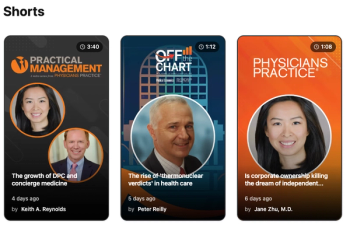
- Physicians Practice September 2023
- Volume 1
- Issue 3
Who owns your practice?
Who should own your practice? Let’s look at the evolving landscape.
Private Equity (PE) wants to take over physician practice, just as hospitals wanted to do in the 90s (and then again in the 2010s). Not content to be marginalized, insurance companies want to own you, too.
If you want to practice medicine outside of academia, here are four primary choices:
- Traditional private practice;
- Hospital-owned practice;
- PE-owned practice; and
- Insurance Company-owned practice.
Today, more than 7 in 10 doctors work for someone other than themselves. The number is growing.With hospitals no longer buying out doctors at their former clip, PE firms and insurance companies have taken up the slack with increasing speed.
To wit: in more than 1 in 4 metropolitan statistical areas (MSAs), more than 30% of the physicians work for a single PE firm. And in 13% of MSAs, a single PE firm controls more than 50% of the doctors. This PE firm may trade under different names depending upon the specialty, but the specialty-specific PEs are part and parcel of a larger PE firm.
To wit, two: Optum, a United Healthcare subsidiary, employs more than 70,000 doctors to practice medicine (as opposed to denying care). That’s about one of every sixteen doctors in the United States working for the insurance company that insures between 12% and 15% of all Americans. If you don’t work for Optum/United, odds are you will be out of their networks when they hire others in your specialty in your market. United is famous for its ‘narrow networks’.
Here, it may be instructive (or at the very least, therapeutic for me) to share a story about Infusion Solutions, an infusion center in Richmond, VA, I co-own. Infusion Solutions opened in 2020. All insurance companies, save United Healthcare and its ‘narrow networks’, welcomed us as a less expensive alternative to hospital infusion centers. United said no thanks to repeated entreaties.
Fast forward to early 2021, when 3,800 Americans were dying daily from COVID, and monoclonal antibodies became available to the general public. With area hospitals overwhelmed with caring for the acutely ill, Infusion Solutions became the primary monoclonal antibody treatment center for Central Virginia.
I went back to United with a simple ask: ‘Let’s save some lives together. Let us help your COVID insureds, and I will never ask to participate in your networks.’ United said no.
Thank you for indulging me with that “Can’t Make This Stuff Up” aside. Let’s get back to the task at hand.
Regulatory intervention is likely the only roadblock to full corporatization of medicine.
This ‘land grab’ by Insurance companies and PE firms has caught the attention of the antitrust folks and regulators. Why? Money. Market concentration and higher prices go hand-in-hand.1
Here’s an example from the world of gastroenterology. Let’s say you have an appointment with your gastroenterologist.If your GI is in private practice, the average price of your visit will be just shy of $250, or about 15% higher than it was a decade ago. But if your GI is part of a PE conglomerate, the average price of your visit will be about $320. You, the patient, are paying almost $70 more by going to a PE GI.
If you’re the PE gastroenterologist, that’s good (provided a big part of the delta goes to you). But if you’re the patient, it’s bad. You’re paying a lot more for the same care because your doctor ‘sold out’. I am not being crass – my doctors’ W-2 was my report card for decades – but believe it’s important you understand how many patients see it. You need to be able to explain to your patients, legislators, and perhaps the local newspaper how your decision to sell your practice was done for the ‘right’ reasons.
Regulators get it.PE firms are buying practices to make money for their investors, not to improve care. Insurance companies are buying practices (and other parts of the healthcare food chain) to make money for investors, not to improve care.
Regulators understand private equity, where the big money is made by flipping assets every 3-5 years. They understand the allure of private equity for you: a bigger paycheck, better reimbursements, and the potential for a big payment when the flip occurs. They understand antitrust, having fought it for decades in other sectors, and know that more consolidation of physician practices will result in higher and higher prices.
We’re at a critical juncture. Insurance companies have increased prior authorization requirements – and therefore, your cost to practice medicine - by almost 24% compared to the pre-pandemic baseline. Have they increased your reimbursement to offset these ‘mandates’? Of course not. Something needed to give. Something gave.
What happens next? More consolidation. It’s happening as I type. Something else might give next, and that something is the topic of the second part of this article.
Lucien W. Roberts, III, MHA, FACMPE is a mostly retired private practice administrator.He has been a member of the Physicians Practice family for many years and continues to share his insights and opinions on occasion.
1 For an in-depth analysis, I recommend “Monetizing Medicine: Private Equity and Competition in Physician Practice Markets”, Richard M. Scheffler et al, American Antitrust institute, July 10, 2023.
Articles in this issue
over 2 years ago
Identifying the litigious patient: Watch for these red flagsover 2 years ago
Messy Moments: Feeling safe enough to speak upNewsletter
Optimize your practice with the Physicians Practice newsletter, offering management pearls, leadership tips, and business strategies tailored for practice administrators and physicians of any specialty.






